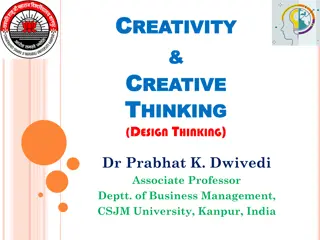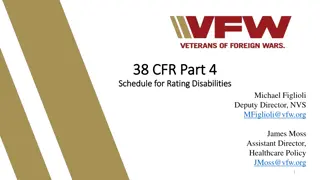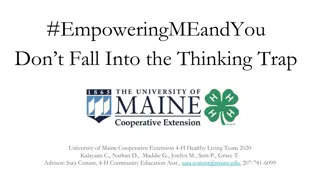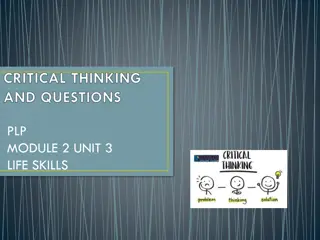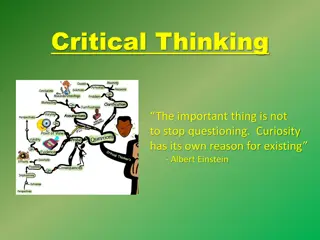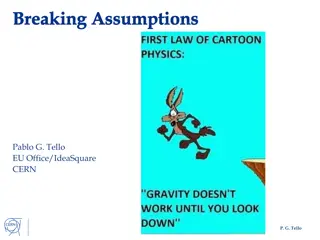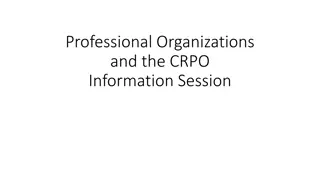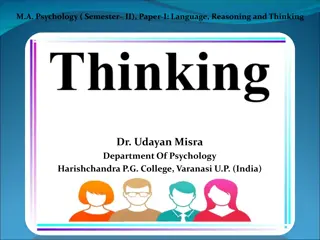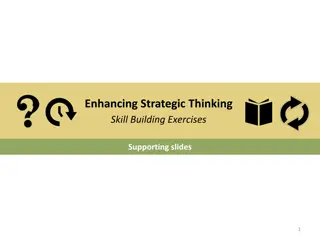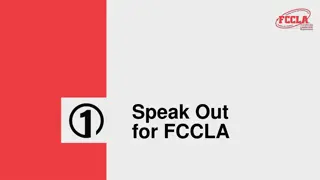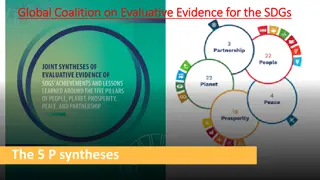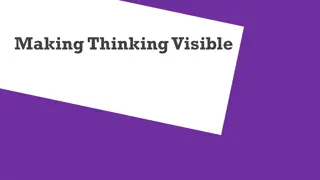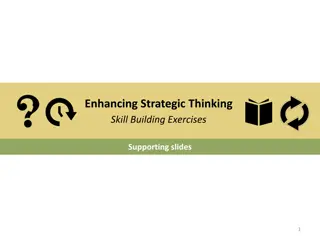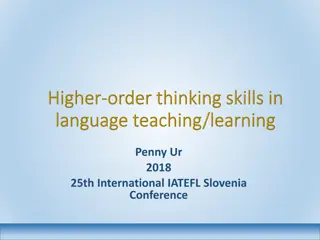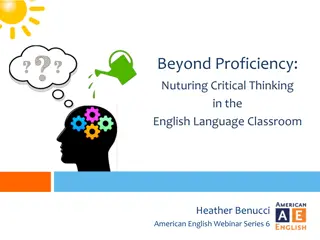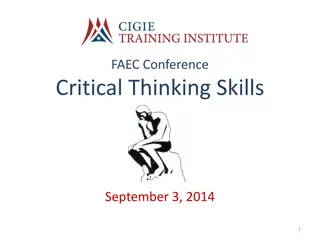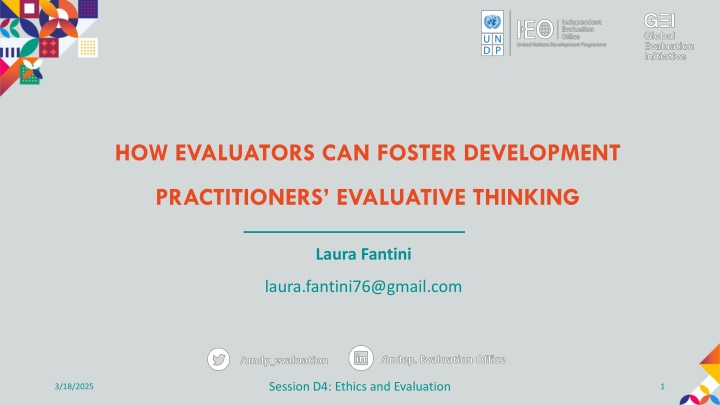
Fostering Evaluative Thinking in Development Practitioners
Discover how evaluators can nurture development practitioners' evaluative thinking skills to enhance project outcomes. Explore the relationship between evaluation and implementation, importance of critical thinking, and strategies for achieving positive impacts in development projects. Learn from case studies in Burkina Faso, Puntland, and a global NGO's approach to rural development.
Download Presentation

Please find below an Image/Link to download the presentation.
The content on the website is provided AS IS for your information and personal use only. It may not be sold, licensed, or shared on other websites without obtaining consent from the author. If you encounter any issues during the download, it is possible that the publisher has removed the file from their server.
You are allowed to download the files provided on this website for personal or commercial use, subject to the condition that they are used lawfully. All files are the property of their respective owners.
The content on the website is provided AS IS for your information and personal use only. It may not be sold, licensed, or shared on other websites without obtaining consent from the author.
E N D
Presentation Transcript
HOW EVALUATORS CAN FOSTER DEVELOPMENT PRACTITIONERS EVALUATIVE THINKING Laura Fantini laura.fantini76@gmail.com Session D4: Ethics and Evaluation 3/18/2025 1
The relationship between evaluation and implementation Development practitioners and evaluators roles in the evaluation process There are implementers capacities that can be valued in evaluations oriented to doing good Critical thinking Attitude to question project assumptions Capacity to value the local knowledge and the local actors Ability to extract lessons Ability to systematize knowledge Evaluative thinking
Looking for doing good Every community has the know-how and the resources to self organize and to find solutions / strategies to face their challenges Positive Deviance approach The example of a global NGO whose main mandate is to foster rural development in the Global South through knowledge management and South-South cooperation. It is specialized in harvesting and scaling-up home-grown innovations, systematizing local successful practices, co-creating local knowledge, and promoting peer-to-peer learning. Its approach in four main steps: 1. To identify local champions and work together with them to elicit their tacit knowledge and know-how 2. Through a participatory process, to systematize the successful and innovative solutions they use to overcome local challenges and to reinforce their critical thinking about their successes 3. To facilitate peer-to-peer learning activities where local champions become trainers for their peers 4. To support the learners to scale up the innovations by adapting them to their contexts
Impact evaluation of water basin intervention in Burkina Faso The intervention implemented by Ministry of Water built up rainwater catchment basins to store water for irrigation during the dry season was considered as a good practices to be analysed and scaled up. The evaluative study was based on the analysis of the solutions already owned by the community; it highlighted many failures: Technical challenges and high costs of maintenance Lack of integration of traditional practices Lack of understanding of local nutrition and water use strategies Equity issues In summary, the evaluation succeeded in demonstrating: - how the construction of rainwater catchment basins - evaluated positively by many experimental studies (RCTs) - when observed in real-life contexts showed unsatisfactory results; - how listening the beneficiaries voice disclosed hidden local success strategies
Positive Deviance in Puntland The intervention funded by IFAD and the Italian Agency for Development Cooperation aims to foster climate change resilience in agriculture and livestock sector in Puntland. Based on the project inception phase no relevant locally-owned resilient practices were in place in the three target regions. The study identified 15 local champions / positive deviants and their related successful practices. After systematizing them, peer-to-peer learning initiatives were organized and leaded together with the Local champions. Main outcome of the whole process was the field project officers change of mindset: They realized that some of the training activities planned in the project concern skills that the local champions already have They will involve them as trainers in the future project training and promote the sustainability of their practices They included the peer-to-peer learning activities as capacity-building tool in their third year of project implementation
Conclusion Both examples aim to disclose the doing good by looking beyond the intervention boundaries (goal free evaluation Scriven), by discovering factors remained underestimated and by giving voice to the direct beneficiaries. They offer to governmental bodies and development aid agencies evidence of how positive deviance works in disclosing complexity, understanding hidden factors of local contexts and valorizes local-led solutions They demonstrate how embedding and promoting practitioners evaluative thinking facilitates an adaptive and more successful project management They show how the project partners and stakeholders can change mindset, attitudes and beliefs in front of the evidence that something can work differently and better They are good examples of the paradigm helper-doers evocated by Ellerman for which the implementers/helpers are facilitators instead of knowledge or service providers and the beneficiaries/doers are actors of changes instead of simple recipients The approach evokes an advocacy and activist role of the evaluator Evaluation and project implementation should not be two separate boxes and they should complement each other
THANK YOU Laura Fantini laura.fantini76@gmail.com

